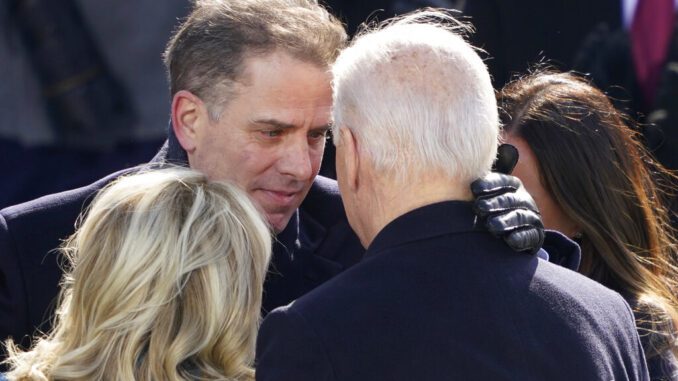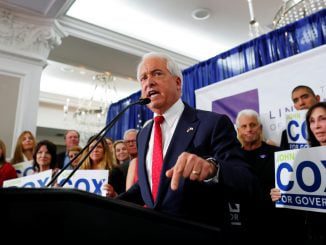
Lies beget lies. That’s one way to summarize nearly the past decade of presidential politics, as well as the potentially dismal presidential race underway.
I leave to others commentary on the big media stories of the past week — the ouster of the talented and high-ratings-earning Tucker Carlson from Fox News, the ouster of the less talented and lower-ratings-earning Don Lemon by CNN, and the ouster by ABC News of the gifted and enlightening elections analyst Nate Silver from the FiveThirtyEight website he created.
These are events of varying consequence, but none may be more consequential than the revelations, obscured by these dismissals, that former CIA Director Michael Morell, at the behest of then-Biden campaign official and now-Secretary of State Antony Blinken, prepared and authored the letter signed by 51 intelligence professionals debunking the New York Post’s story on Hunter Biden’s laptop as having “all the classic earmarks of a Russian information operation.”
The original New York Post story appeared on Oct. 14, 2020, just 20 days before the November general election. It reported on the contents of a laptop that candidate Joe Biden’s son Hunter had left at a Delaware repair shop and never retrieved.
The laptop materials included 2014 emails to and from the Ukrainian firm Burisma, which had been paying Hunter Biden $50,000 a month, including a thank you for arranging an introduction to then-Vice President Joe Biden. It also included a video of Hunter Biden apparently smoking crack and having sex.
Not a helpful development for Joe Biden’s presidential campaign, to say the least. In private testimony to the House Judiciary Committee, Morell said that Blinken “reached out” to him and, in response, Morell wrote the letter and obtained the signatures of 50 other former intelligence and defense officials.
The letter achieved its intended purpose. It was all “dezinformatsiya!” Without a shred of evidence, most American media and Facebook and Twitter happily blocked the New York Post story. Joe Biden, in the final presidential debate, was able to dismiss the story as Russian propaganda because of a propaganda effort that had started within his own campaign.
The lie promoted by Blinken and Morell served its purpose: Biden was elected president. Sixteen months later, in March 2022, The New York Times offhandedly mentioned, in the 24th paragraph of a 38-paragraph story, that the laptop had been “authenticated.”
Don’t expect any apologies from the 51 intelligence officials and the media who helped suppress this information, keeping it from American voters, nor from media outlets that warn that “democracy dies in darkness.” In private, these folks might admit that they concealed the truth to save the country from Hitler or at least from a uniquely terrible president. I’m sure you’d hear similar excuses for the perpetrators and peddlers of the Russia collusion hoax.
That was a “conspiracy theory,” as I wrote in January, “concocted by the Hillary Clinton campaign … aided and abetted by leaders of the FBI and intelligence agencies, advanced by lies and misrepresentations by congressional Democrats, and reported with relish and credulity by much of the media.” Those who dismiss inconvenient truths as conspiracy theories have been perpetrating one of the two biggest conspiracy theories of the last decade.
All of which brings to mind an old adage: Nothing is free in politics, there is just some question about when you pay the price. Those who suppressed the Hunter Biden laptop story got what they wanted in the short term. But in the long term, they have destroyed for millions of Americans the credibility of the intelligence and foreign policy institutions they were privileged to serve.
But, as I said at the beginning, lies beget lies. Many Trump opponents will point out that Donald Trump has often lied, and never more outrageously and harmfully than in his pathetic denials that he actually won the 2020 election. Especially pathetic has been his claim on Jan. 6, 2021, that he won in a “landslide.”
In fact, Trump lost the popular vote by an even wider margin, in percentage and in numbers, than he had in 2016. That year, he won an Electoral College majority by 77,736 popular votes in three states. In 2020, he lost it by 42,918 popular votes in three states. He filled an inside straight the first time and missed it the second time.
You hear similar prevarication from Trump these days in his attacks on Florida Gov. Ron DeSantis, likely his strongest opponent for the Republican nomination next year. The former president thrashes around, opposing stances he took and statements he made as president, as Dan McLaughlin argues persuasively in the National Review.
My advice to Republican primary voters who are justifiably tired of the media and national security professionals lying and suppressing the truth: Don’t renominate a candidate who does the same thing.
Michael Barone is a senior political analyst for the Washington Examiner, resident fellow at the American Enterprise Institute and longtime co-author of “The Almanac of American Politics.”



